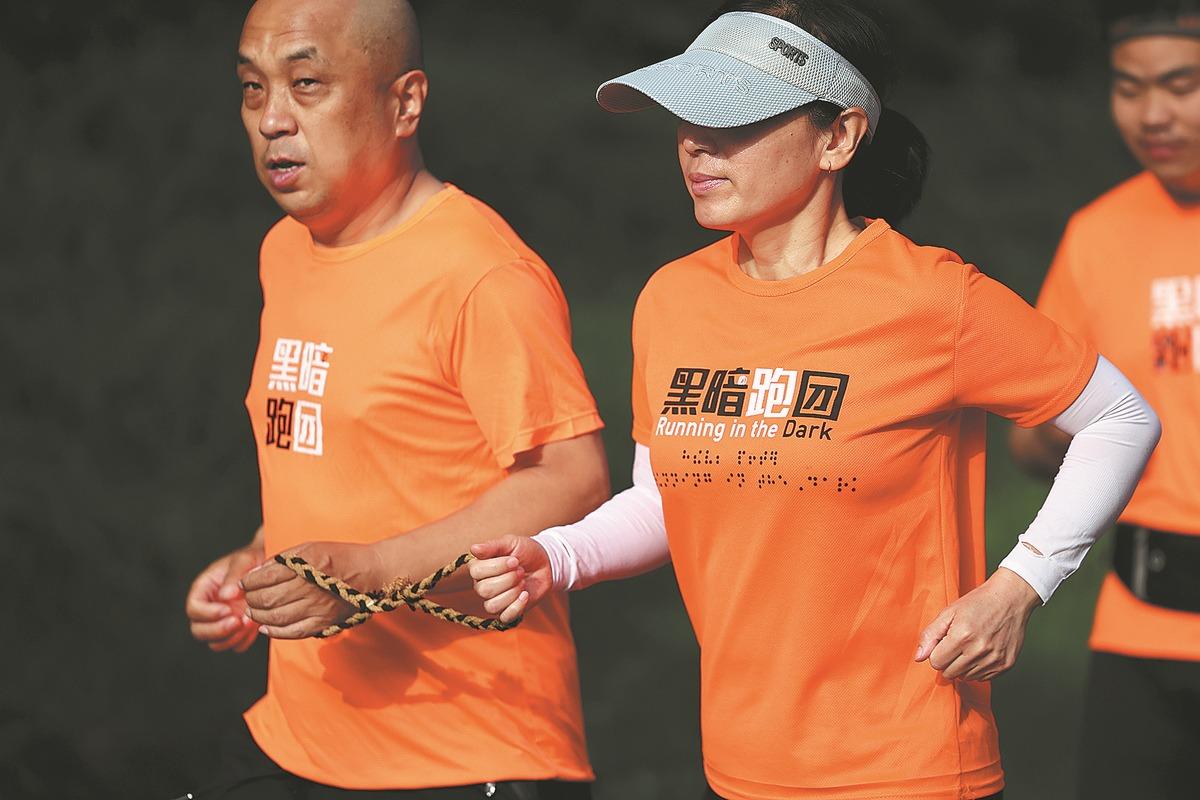 A volunteer guides a visually impaired runner with a hemp rope at the Beijing Olympic Forest Park in June 2023. (WEI XIAOHAO / CHINA DAILY)
A volunteer guides a visually impaired runner with a hemp rope at the Beijing Olympic Forest Park in June 2023. (WEI XIAOHAO / CHINA DAILY)
Every Thursday and Sunday morning, a group of runners with impaired vision or hearing sets off from a rest area near the south gate of Beijing Olympic Forest Park.
The area, one of several established at the park last year, sits beside the running and walking track, and serves as a warm-up base for the runners, who are accompanied by volunteers as they aim to improve their fitness levels.
Running not only benefits these athletes by enhancing their physical well-being, it also has a beneficial effect on the volunteers, who are inspired by their charges' perseverance, determination and optimistic outlook.
Yao Taotao, 38, who has retinitis pigmentosa — a chronic hereditary eye disease — and one of the volunteers were connected by a hemp rope as they ran at the same pace. They rarely spoke — the only sounds being the occasional summer breeze and the runners' breathing and footsteps
At 8 am on a sunny morning last month, Yao Taotao, 38, who has retinitis pigmentosa — a chronic hereditary eye disease — and has been legally blind since he was 1, did some stretches before taking to the track. He followed the movements of two volunteers, who act as regular trainers.
The three runners set an impressive pace, completing the 5-kilometer lap of the southern part of the park within 40 minutes.
Yao and one of the volunteers were connected by a hemp rope as they ran at the same pace. They rarely spoke — the only sounds being the occasional summer breeze and the runners' breathing and footsteps.
"As I can no longer see, I place all my trust in the volunteers when I run," Yao said.
Even though he is not always accompanied to his local subway station, he cherishes the opportunity to run every week.
"As I'm completely blind now, when I walk from my home to take the subway to Olympic Forest Park, I have to rely on my memory of the route," said Yao, who works at a blind massage parlor in the Haidian district of Beijing.
"However, sometimes I receive help. For example, a kind couple saw me on the road this morning and offered to take me to the subway station."
Yao was one of 15 people with impaired vision or hearing who ran at Olympic Forest Park on the day, who were accompanied by more than 30 volunteers.
ALSO READ: Taking a good run at life
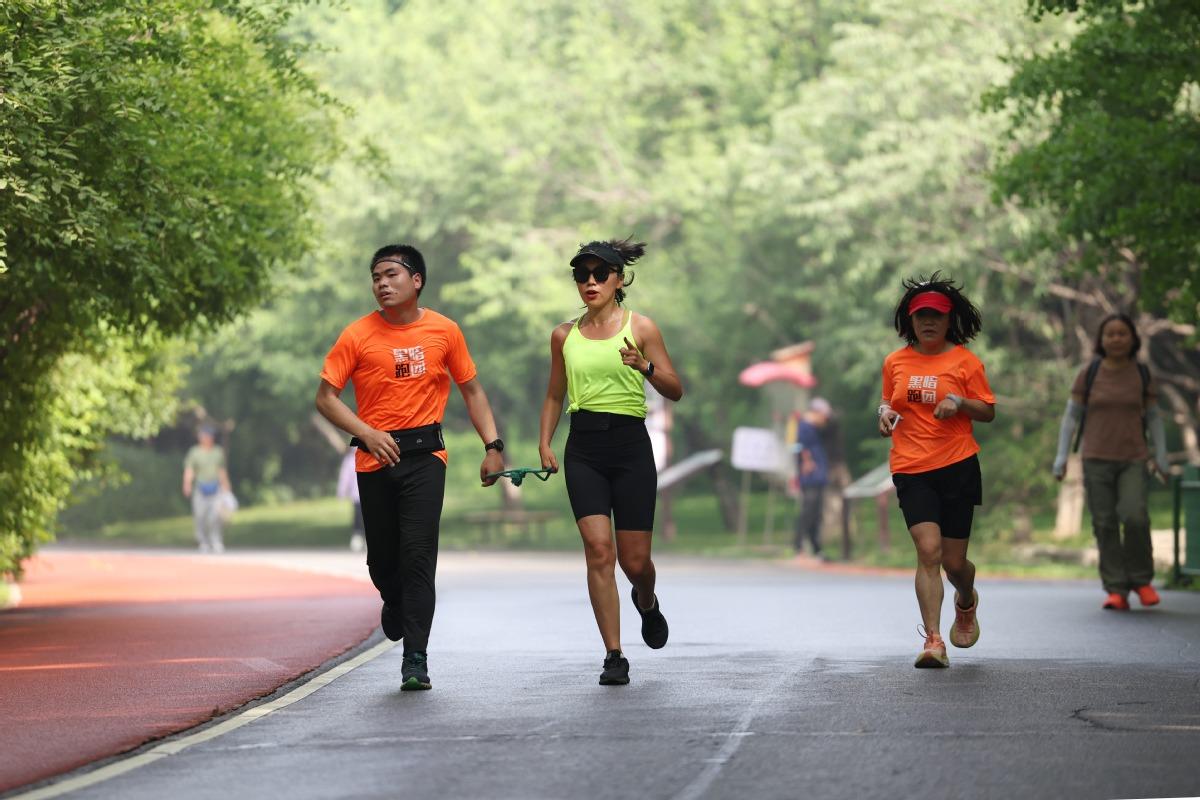 A visually impaired athlete is accompanied by a volunteer. (WEI XIAOHAO / CHINA DAILY)
A visually impaired athlete is accompanied by a volunteer. (WEI XIAOHAO / CHINA DAILY)
This activity, which has been staged for the past five years, is organized by the Beijing branch of Running in the Dark, a charity running group formed in October 2019.
As I can no longer see, I place all my trust in the volunteers when I run ... As I'm completely blind now, when I walk from my home to take the subway to Olympic Forest Park, I have to rely on my memory of the route ... However, sometimes I receive help. For example, a kind couple saw me on the road this morning and offered to take me to the subway station.
Yao Taotao, visually impaired runner
The founder and organizer of the group's branch in the Chinese capital is He Xiaoyun, 52, a Beijing native. She and about five regular volunteers hold charity runs at Olympic Forest Park on Thursdays and Sundays at 7 am and 8 am.
About 1,600 volunteers have joined the Beijing branch, ranging in age from 5 to 74, and assisting more than 400 visually impaired and hearing impaired runners.
Volunteers accompanying the athletes walk or run varying distances, either walking for 3 km, or running for 5 km, 10 km or 15 km.
One or two days before a run, the volunteers post registration links on the branch's WeChat group, specifying their preferred distance and starting time. Volunteers from the logistics team, which usually comprises about 10 people, accompany visually impaired runners from the subway station and assist them during the run.
After registration, the volunteers meet up with the runners and gather at the rest area.
One of the volunteers then leads a warmup routine, which includes exercises such as turning, high-knee steps, and walking on the spot.
Experienced volunteers offer additional support by holding visually impaired participants' hands or arms.
Joint benefits
Ding Hua, 47, the mother of a 16-year-old daughter, has worked as a volunteer for the charity group for about two and a half years. She learned about Running in the Dark when she met with a visually impaired runner from the group on the Beijing subway last year.
A half-marathon runner, Ding had seldom accompanied others on a run previously, as she trained most of the time alone.
She said she enjoys being part of the charity group and running with visually impaired people because everyone is willing to communicate and connect with each other.
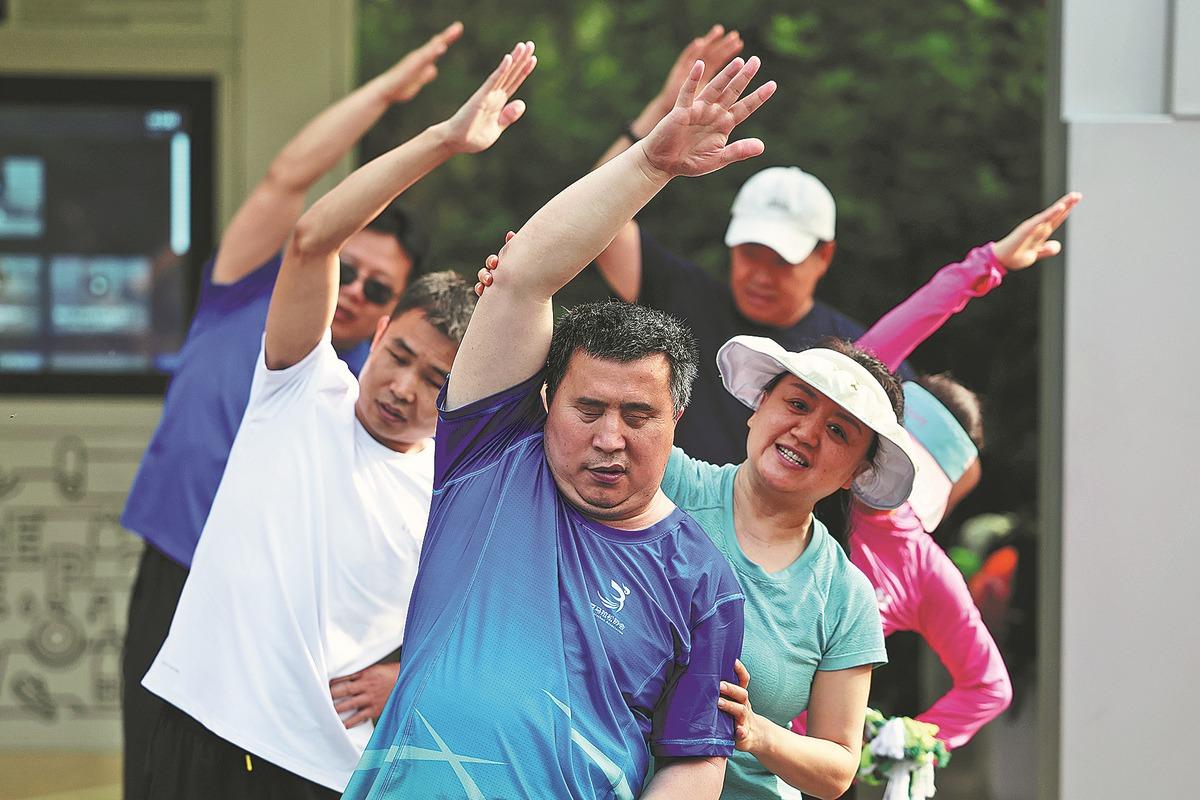 Chai Jingtai (front) stretches with other visually impaired runners and volunteers before a morning run at Beijing Olympic Forest Park in June 2023. (WEI XIAOHAO / CHINA DAILY)
Chai Jingtai (front) stretches with other visually impaired runners and volunteers before a morning run at Beijing Olympic Forest Park in June 2023. (WEI XIAOHAO / CHINA DAILY)
"Sometimes, when visually impaired friends run faster than me, I try my best to keep up with them. I occasionally feel like giving up after running 5 km, but the encouragement from my friends gives me the determination to keep going," Ding said.
ALSO READ: AI app helps 'born to run' blind man complete solo 5k
The founder and organizer of the Beijing branch of Running in the Dark, a charity running group formed in October 2019, is He Xiaoyun, 52, a Beijing native. She and about five regular volunteers hold charity runs at Olympic Forest Park on Thursdays and Sundays at 7 am and 8 am
The running track in the southern part of Olympic Forest Park passes various sites, including an arts center, the ecological corridor to the northern area of the park, a wetland, and Olympic Manifesto Square.
Ding seldom attempts to encourage her charges to run. Instead, she tells them about the potential dangers and obstacles that lie ahead.
"There are three more inclines in front of us, and after that, we will arrive at our final stop today," she tells them.
Many of the runners she accompanies reached the finishing line without making any stops.
"This gives me a sense of achievement, which is hard to find elsewhere in my daily life, as I am usually busy looking after my child and doing housework," she said.
Running can be enjoyable, but it is difficult to share enthusiasm for the sport with others, Ding said.
"That's where companionship comes in. By sharing the positive energy, excitement and upbeat attitude that comes from running and other forms of exercise, you help those who are visually impaired, or who are experiencing negative emotions," she said.
"Although I initially took up running to stay healthy and in shape, I soon found that sharing the activity with others made me happy and positive, which in turn pushed me to become more actively involved with running."
Regained confidence
The positive energy and sense of happiness gained from running can leave a lasting impression on visually impaired participants.
That's where companionship comes in. By sharing the positive energy, excitement and upbeat attitude that comes from running and other forms of exercise, you help those who are visually impaired, or who are experiencing negative emotions.
Ding Hua, mother of a 16-year-old daughter
Despite experiencing the ups and downs of life, runners continue to join up with the charity group members because of the support and encouragement they provide.
Yao, the visually impaired runner, first came to Beijing in 2010 to work as a blind masseur and returned to his hometown in Handan, Hebei province, in 2015 to get married. Last year, he came back to the Chinese capital for work.
Born and raised in a small village in Handan, Yao, who has a sister and brother, said that when he was 15, his mother refused his request to learn massage techniques because this cost 1,800 yuan ($254), equivalent to three months' income for Yao's parents.
ALSO READ: Not afraid to run blind
However, in his 20s, he was able to study basic massage therapy skills for free with the support of national policies, and began earning a living through this work.
He gradually improved his skills by practicing and paying for more advanced courses in massage therapy, before securing a masseur's job in Beijing that paid more than 10,000 yuan per month.
"My feeling toward my parents now is that they brought me up from childhood, and I will take care of them when they are old," Yao said.
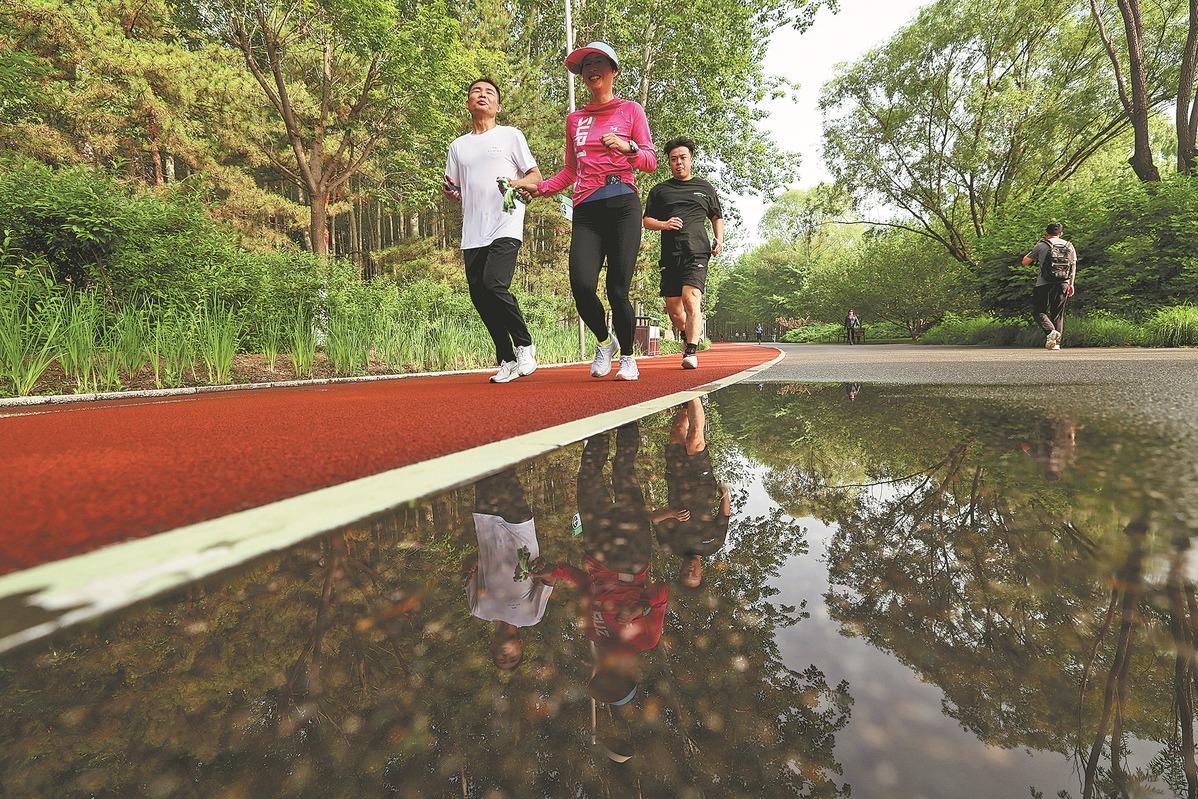 Yao Taotao (front left) is accompanied by two volunteers at Beijing Olympic Forest Park. (WEI XIAOHAO / CHINA DAILY)
Yao Taotao (front left) is accompanied by two volunteers at Beijing Olympic Forest Park. (WEI XIAOHAO / CHINA DAILY)
"However, when I lost my sight and the doctor concluded that it could not be restored, I thought my parents were disheartened by my disability and decided I could do little apart from staying at home.
Yao Taotao said that when he first started running in the winter of 2014, he struggled to complete 3 km at a time, running about 1.5 km before walking for the same distance. His strength and stamina improved as he continued to run
"But my confidence has been restored, thanks largely to the massage therapy skills that enable me to earn a living. Running with volunteers in the park also helps, as it not only improves my cardiovascular fitness but broadens the mind."
Yao said that when he first started running in the winter of 2014, he struggled to complete 3 km at a time, running about 1.5 km before walking for the same distance. His strength and stamina improved as he continued to run.
The female volunteer who accompanied him in 2014 worked at a police station in Haidian. Yao said that even though they no longer run together, he keeps in touch with her on WeChat.
"As we ran, we shared stories about our daily life, discussed our favorite places to visit, food to eat, or the cases she was handling at work," Yao said.
Information exchange
Volunteers joining the charity running group quickly realize that their charges do not easily concede defeat.
By offering their time and energy, the volunteers enable these participants to have similar experiences to those with normal vision or hearing.
Qi Longlin, 54, who is a frequent runner, often noticed visually or hearing impaired people running in Olympic Forest Park, so he joined the charity organization late last month.
He accompanied three visually impaired athletes, and during his second run, he met with Yang Kun, the fastest such runner in the charity group. Despite keeping up with Yang on the first lap, Qi was frustrated when he eventually had to stop because of Yang's faster pace.
By offering their time and energy, the volunteers enable these participants to have similar experiences to those with normal vision or hearing
But his mood improved when Chai Jingtai, a 47-year-old visually impaired athlete, joined him for a run.
Without paying much attention to their speed, the pair talked most of the time they were running. When they completed half a lap of the track, Chai told Qi that he lost 110,000 yuan in a scam last year.
ALSO READ: Lack of guide runners becomes hurdle for Tokyo Paralympians
Qi said, "If we can't control other people's behavior, why let it make us unhappy by thinking about it?" He told a story to comfort Chai, whose mood lightened as he sang a song he wrote and composed for Qi.
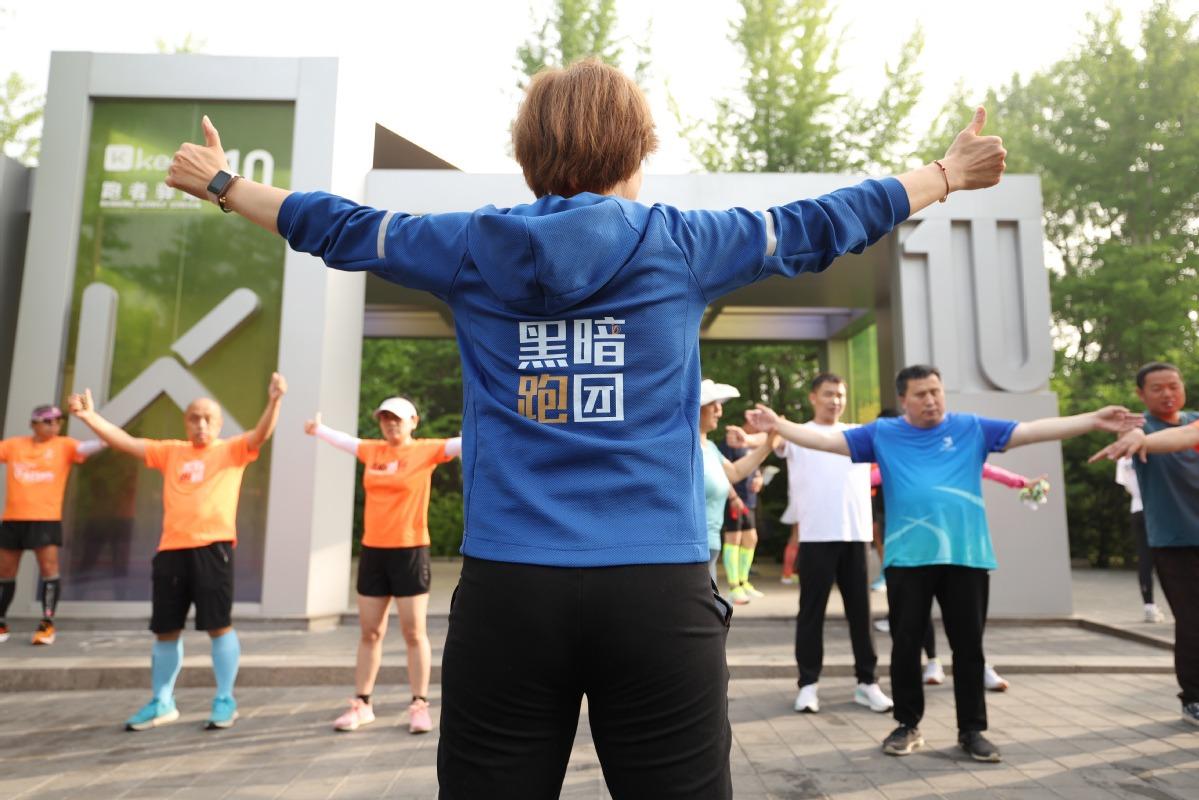 A volunteer stretches with visually impaired runners before a morning run at Beijing Olympic Forest Park in June 2023. (WEI XIAOHAO / CHINA DAILY)
A volunteer stretches with visually impaired runners before a morning run at Beijing Olympic Forest Park in June 2023. (WEI XIAOHAO / CHINA DAILY)
After bonding for about 50 minutes, the pair found that in addition to running, they had other common interests.
Qi started consulting Chai, a blind masseur, on the specific details of nutrition and the acupoints used in traditional Chinese massage.
He asked Chai, "If I accompany you on a run, can you tell me how I can further improve my health in the future?" The latter happily agreed.
Fresh hope
He, the founder and organizer of Running in the Dark's Beijing branch, said: "As a group, we are involved with many runners, not just our visually impaired friends, who join us because other groups do not accept them. They are considered old, weak and disabled by these groups, who favor fast runners. However, we accept them all."
Running in the Dark has received considerable support, including participating quotas for important marathon events. Representatives from technology companies such as Apple and VMware occasionally visit Olympic Forest Park to join the charity group in interacting with visually impaired runners and giving them emotional support.
As a group, we are involved with many runners, not just our visually impaired friends, who join us because other groups do not accept them. They are considered old, weak and disabled by these groups, who favor fast runners. However, we accept them all.
He Xiaoyun, founder and organizer of the Beijing branch of Running in the Dark, a charity running group formed in October 2019
Visually impaired people are often more resilient and determined than others because of their physical limitations, He said. They strive harder to achieve the same level of success as those without such disabilities.
"When they complete tasks that someone who is not visually impaired cannot do, they feel especially proud of themselves. Such a feeling is crucial for them to take part in sports, as it gives them new hope for their lives," He said.
As a volunteer, He said she feels fulfilled, as her achievements have been recognized by others.
"Ultimately, you may become addicted to this feeling of happiness that comes from helping others and being needed," she said.
In April, on her 52nd birthday, He received dozens of congratulatory messages, including notes from runners with impaired hearing. She also received video messages in sign language wishing her good health.
READ MORE: No sight, but still on the lookout for love
She even received congratulatory messages from volunteers and runners from outside Beijing.
"These are things that money can't buy. I received those messages because of what I have done. My work and that of the volunteers in the running group make us feel appreciated," she said.


